牛津译林英语七年级下册Units 3 & 4 Study skills(视频嵌入)(共31张PPT)
文档属性
| 名称 | 牛津译林英语七年级下册Units 3 & 4 Study skills(视频嵌入)(共31张PPT) |
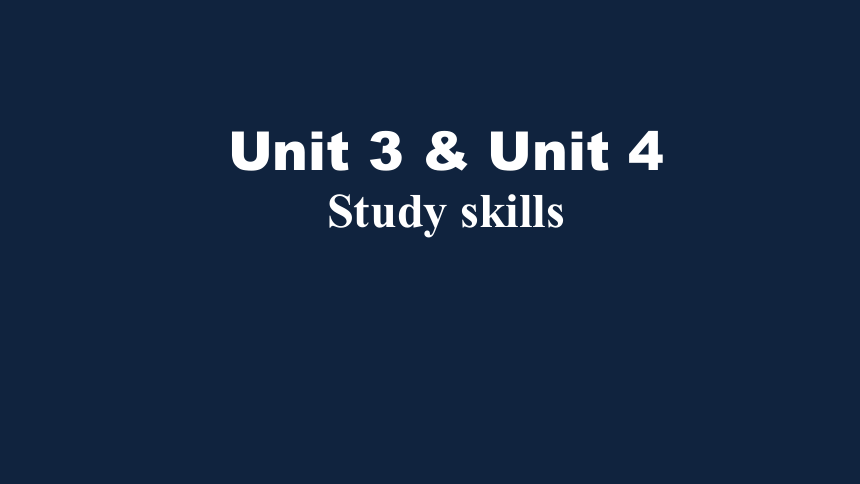
|
|
| 格式 | zip | ||
| 文件大小 | 23.6MB | ||
| 资源类型 | 教案 | ||
| 版本资源 | 牛津译林版 | ||
| 科目 | 英语 | ||
| 更新时间 | 2020-04-29 00:00:00 | ||
图片预览


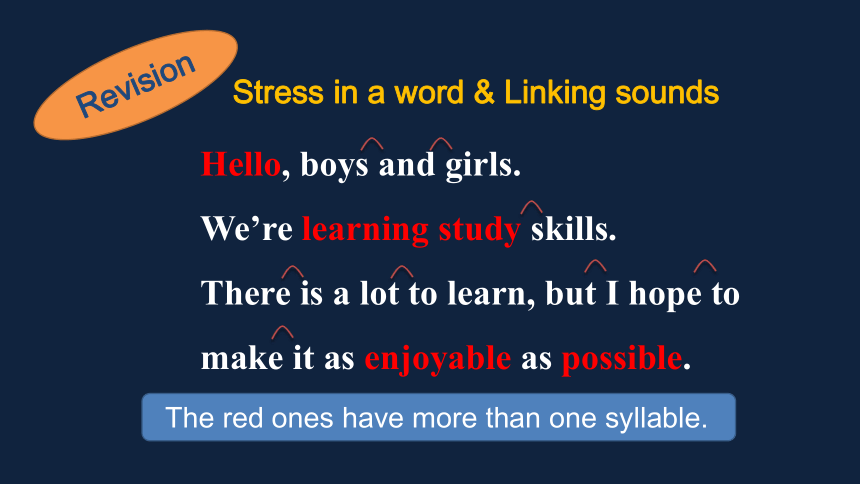

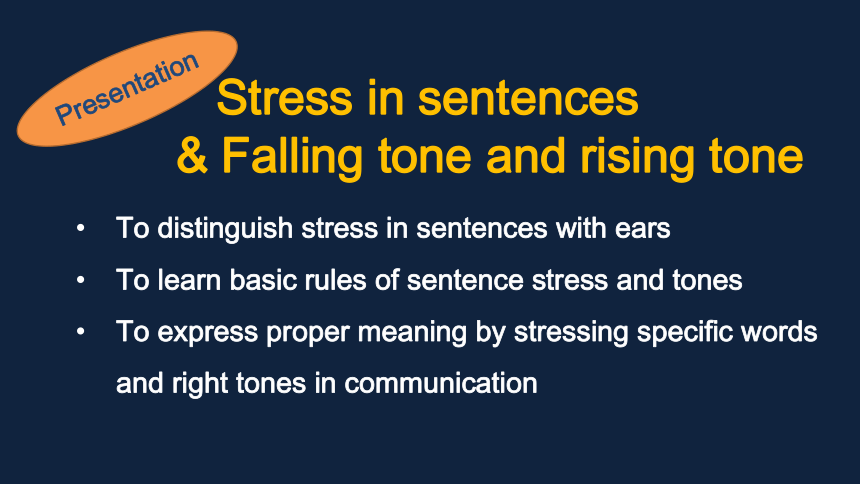
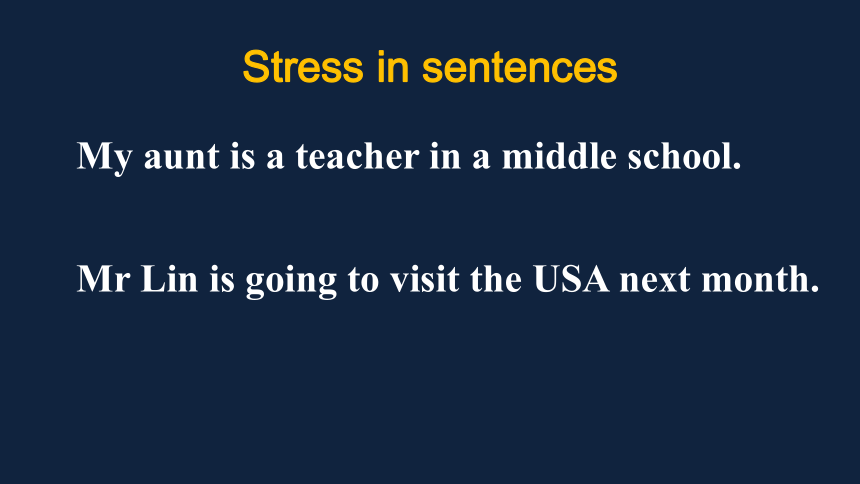
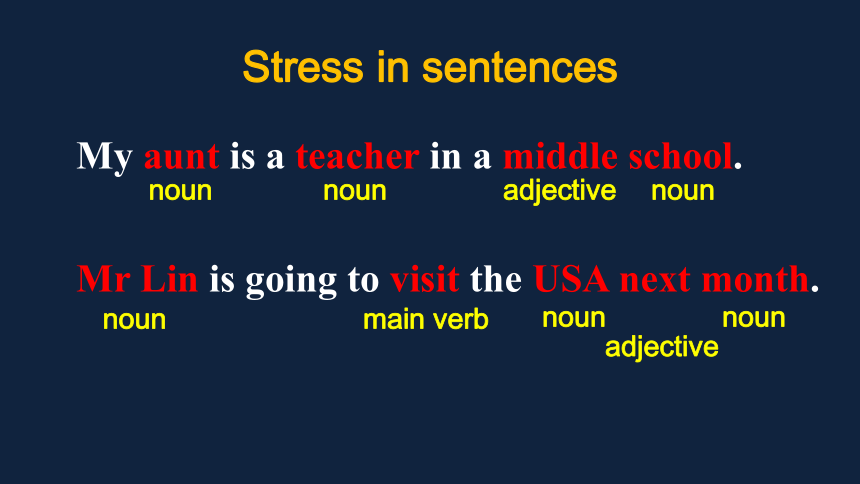
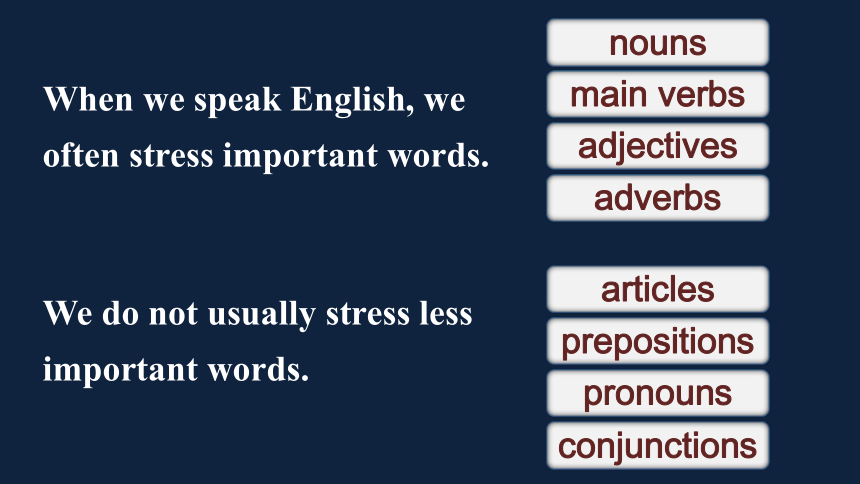
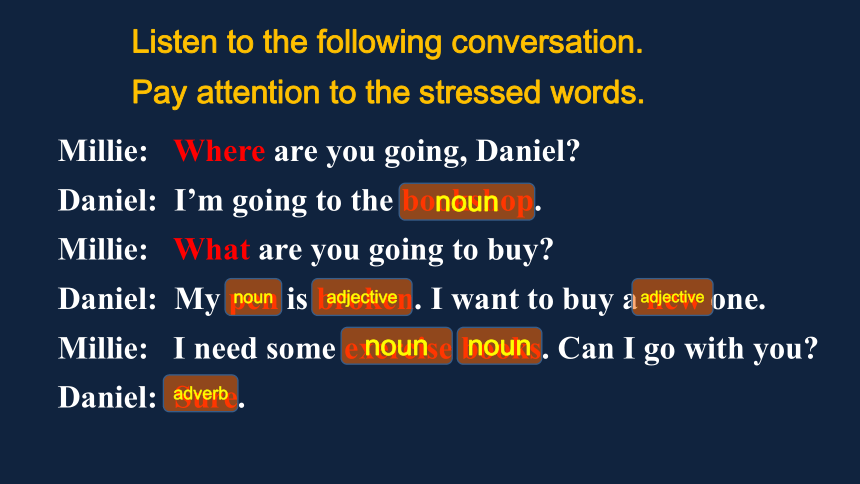
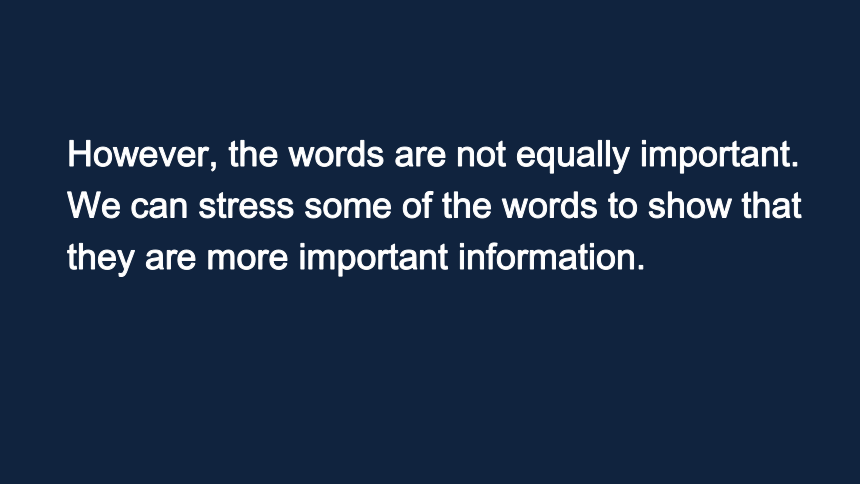
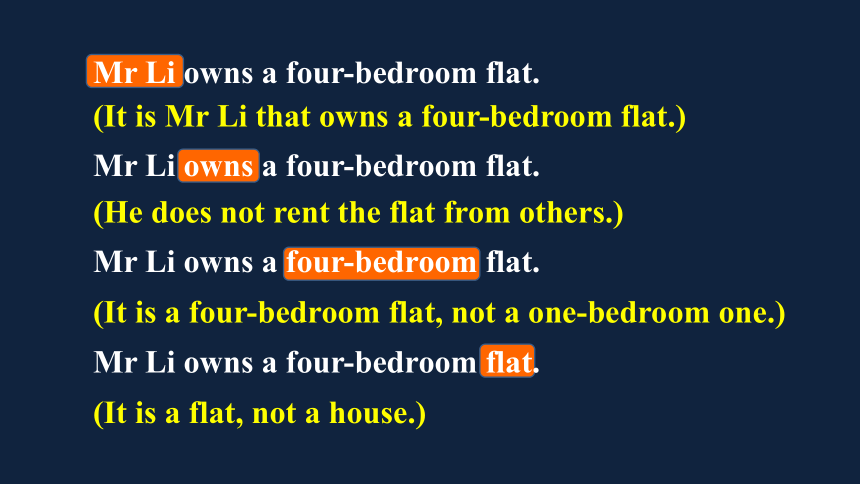
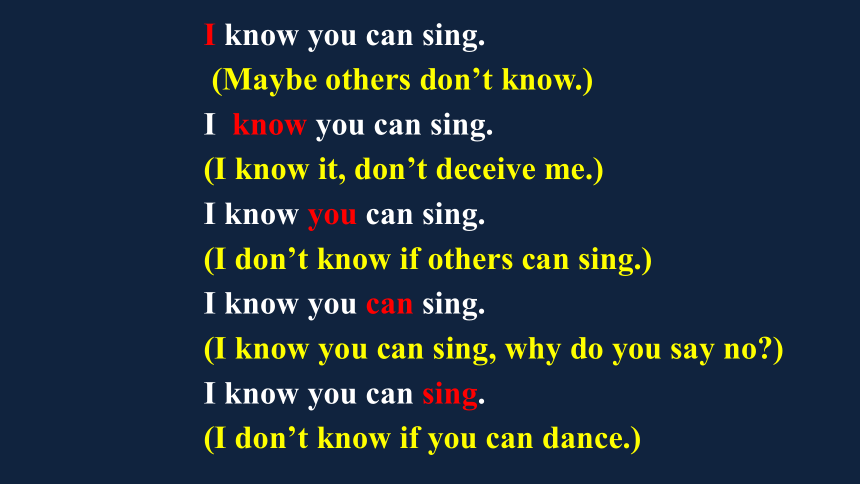
文档简介
课件31张PPT。Unit 3 & Unit 4
Study skillsHello, boys and girls.
We’re learning study skills.
There is a lot to learn, but I hope to make it as enjoyable as possible.RevisionStress in a word & Linking soundsRevisionStress in a word & Linking soundsHello, boys and girls.
We’re learning study skills.
There is a lot to learn, but I hope to make it as enjoyable as possible. Stress in sentences
& Falling tone and rising toneTo distinguish stress in sentences with ears
To learn basic rules of sentence stress and tones
To express proper meaning by stressing specific words and right tones in communicationPresentationMy aunt is a teacher in a middle school.
Mr Lin is going to visit the USA next month.Stress in sentencesMy aunt is a teacher in a middle school.
Mr Lin is going to visit the USA next month.nounnounnounnounnounadjectivemain verbadjectivenounStress in sentencesWhen we speak English, we often stress important words. nounsmain verbsadjectivesadverbsWe do not usually stress less important words.articlesprepositionspronounsconjunctionsListen to the following conversation.
Pay attention to the stressed words.Millie: Where are you going, Daniel?
Daniel: I’m going to the bookshop.
Millie: What are you going to buy?
Daniel: My pen is broken. I want to buy a new one.
Millie: I need some exercise books. Can I go with you?
Daniel: Sure.adverbHowever, the words are not equally important.
We can stress some of the words to show that they are more important information.Mr Li owns a four-bedroom flat.
Mr Li owns a four-bedroom flat.
(He does not rent the flat from others.)
Mr Li owns a four-bedroom flat.
(It is a four-bedroom flat, not a one-bedroom one.)
Mr Li owns a four-bedroom flat.
(It is a flat, not a house.)(It is Mr Li that owns a four-bedroom flat.)I know you can sing.
(Maybe others don’t know.)
I know you can sing.
(I know it, don’t deceive me.)
I know you can sing.
(I don’t know if others can sing.)
I know you can sing.
(I know you can sing, why do you say no?)
I know you can sing.
(I don’t know if you can dance.)
Read the sentences below. Stress the different words according to the meanings you want to express.1. I want to buy a CD at the bookshop.
a. I am talking about buying a CD, not borrowing one.
I want to buy a CD at the bookshop.
b. I am talking about a bookshop, not another kind of shop.
I want to buy a CD at the bookshop.
c. I am talking about a CD, not something else.
I want to buy a CD at the bookshop.
2. Daniel sometimes watches TV on Sunday morning.
a. I am talking about watching TV, not another activity.
Daniel sometimes watches TV on Sunday morning.
b. I am talking about Daniel, not another student in the class.
Daniel sometimes watches TV on Sunday morning.
c. I am talking about Sunday morning, not another morning.
Daniel sometimes watches TV on Sunday morning.Falling tone and rising tonePresentation 英语有两种基本的语调: 升调和降调。
不同的语调可以表示说话人不同的态度和不同的隐含意思。
英语中同一句话采用不同的语调会产生截然不同的语意概念。
语调具有强烈的感彩,它使语言更富有表现力。 When we speak, we drop our tone at the end of a statement. There is a path between the hills. 2. Pandas are cute.When we ask a yes / no question, our tone rises at the end of the question. Are there any lions?
2. Is the zoo far away from our school?1. What can you see across the bridge?
2. How do I get there?When we ask a wh- question, our tone usually falls at the end of the question.Simon: The zoo is about three kilometres
away from our school.
Daniel: Three kilometres?We make our tone rise at the end of a sentence to show surprise.1. Just cross the road.
2. Is it a sunny day?
3. We’re having an English lesson now.
4. ---John is going to be on TV tonight.
---John?Read the sentences below. Put a falling arrow or a rising arrow at the end of each sentence.Read the conversation below.
Put a falling arrow or a rising arrow at the end of each sentence. Millie: Hi, Sandy. Tomorrow is Saturday. Would you like to go and see a film?
Sandy: Yes, I’d like to. Which cinema do you want to go to?
Millie: The one at Sunshine Shopping Mall.
Sandy: Sunshine Shopping Mall?
Millie: Sure. We can go shopping there too.
Sandy: Good idea. When shall we meet?
Millie: Is 2 p.m. OK?
Sandy: All right. See you then. PracticeWhat kind of mood can you get from his words?……321StartReadyWell doneConclusionStress in sentencesunstressedstressednouns (名词)
main verbs (主要动词)
adjectives (形容词)
adverbs (副词)articles (冠词)
prepositions (介词)
pronouns (代词)
conjunctions (连词)(1)升调 (rising tone): 升调多用来表示“不肯定”和“未完结”的意思。比如一般疑问句,语气婉转的祈使句,以及用陈述句子形式表示疑问或惊讶的各类句子。
(2)降调 (falling tone): 降调表示“肯定”和“完结”。一般用于陈述句、特殊疑问句、表达指令的祈使句和感叹句中。ConclusionFalling tone and rising toneHomework
1. Review the rules of the stress and tones.
2. Try to practise more after class, pay more
attention to stress in sentences and tones. Thank you!
Study skillsHello, boys and girls.
We’re learning study skills.
There is a lot to learn, but I hope to make it as enjoyable as possible.RevisionStress in a word & Linking soundsRevisionStress in a word & Linking soundsHello, boys and girls.
We’re learning study skills.
There is a lot to learn, but I hope to make it as enjoyable as possible. Stress in sentences
& Falling tone and rising toneTo distinguish stress in sentences with ears
To learn basic rules of sentence stress and tones
To express proper meaning by stressing specific words and right tones in communicationPresentationMy aunt is a teacher in a middle school.
Mr Lin is going to visit the USA next month.Stress in sentencesMy aunt is a teacher in a middle school.
Mr Lin is going to visit the USA next month.nounnounnounnounnounadjectivemain verbadjectivenounStress in sentencesWhen we speak English, we often stress important words. nounsmain verbsadjectivesadverbsWe do not usually stress less important words.articlesprepositionspronounsconjunctionsListen to the following conversation.
Pay attention to the stressed words.Millie: Where are you going, Daniel?
Daniel: I’m going to the bookshop.
Millie: What are you going to buy?
Daniel: My pen is broken. I want to buy a new one.
Millie: I need some exercise books. Can I go with you?
Daniel: Sure.adverbHowever, the words are not equally important.
We can stress some of the words to show that they are more important information.Mr Li owns a four-bedroom flat.
Mr Li owns a four-bedroom flat.
(He does not rent the flat from others.)
Mr Li owns a four-bedroom flat.
(It is a four-bedroom flat, not a one-bedroom one.)
Mr Li owns a four-bedroom flat.
(It is a flat, not a house.)(It is Mr Li that owns a four-bedroom flat.)I know you can sing.
(Maybe others don’t know.)
I know you can sing.
(I know it, don’t deceive me.)
I know you can sing.
(I don’t know if others can sing.)
I know you can sing.
(I know you can sing, why do you say no?)
I know you can sing.
(I don’t know if you can dance.)
Read the sentences below. Stress the different words according to the meanings you want to express.1. I want to buy a CD at the bookshop.
a. I am talking about buying a CD, not borrowing one.
I want to buy a CD at the bookshop.
b. I am talking about a bookshop, not another kind of shop.
I want to buy a CD at the bookshop.
c. I am talking about a CD, not something else.
I want to buy a CD at the bookshop.
2. Daniel sometimes watches TV on Sunday morning.
a. I am talking about watching TV, not another activity.
Daniel sometimes watches TV on Sunday morning.
b. I am talking about Daniel, not another student in the class.
Daniel sometimes watches TV on Sunday morning.
c. I am talking about Sunday morning, not another morning.
Daniel sometimes watches TV on Sunday morning.Falling tone and rising tonePresentation 英语有两种基本的语调: 升调和降调。
不同的语调可以表示说话人不同的态度和不同的隐含意思。
英语中同一句话采用不同的语调会产生截然不同的语意概念。
语调具有强烈的感彩,它使语言更富有表现力。 When we speak, we drop our tone at the end of a statement. There is a path between the hills. 2. Pandas are cute.When we ask a yes / no question, our tone rises at the end of the question. Are there any lions?
2. Is the zoo far away from our school?1. What can you see across the bridge?
2. How do I get there?When we ask a wh- question, our tone usually falls at the end of the question.Simon: The zoo is about three kilometres
away from our school.
Daniel: Three kilometres?We make our tone rise at the end of a sentence to show surprise.1. Just cross the road.
2. Is it a sunny day?
3. We’re having an English lesson now.
4. ---John is going to be on TV tonight.
---John?Read the sentences below. Put a falling arrow or a rising arrow at the end of each sentence.Read the conversation below.
Put a falling arrow or a rising arrow at the end of each sentence. Millie: Hi, Sandy. Tomorrow is Saturday. Would you like to go and see a film?
Sandy: Yes, I’d like to. Which cinema do you want to go to?
Millie: The one at Sunshine Shopping Mall.
Sandy: Sunshine Shopping Mall?
Millie: Sure. We can go shopping there too.
Sandy: Good idea. When shall we meet?
Millie: Is 2 p.m. OK?
Sandy: All right. See you then. PracticeWhat kind of mood can you get from his words?……321StartReadyWell doneConclusionStress in sentencesunstressedstressednouns (名词)
main verbs (主要动词)
adjectives (形容词)
adverbs (副词)articles (冠词)
prepositions (介词)
pronouns (代词)
conjunctions (连词)(1)升调 (rising tone): 升调多用来表示“不肯定”和“未完结”的意思。比如一般疑问句,语气婉转的祈使句,以及用陈述句子形式表示疑问或惊讶的各类句子。
(2)降调 (falling tone): 降调表示“肯定”和“完结”。一般用于陈述句、特殊疑问句、表达指令的祈使句和感叹句中。ConclusionFalling tone and rising toneHomework
1. Review the rules of the stress and tones.
2. Try to practise more after class, pay more
attention to stress in sentences and tones. Thank you!
